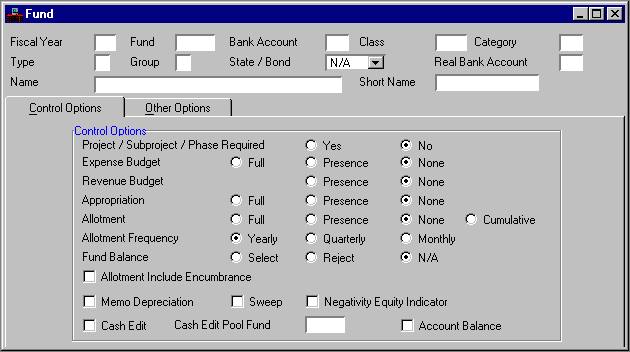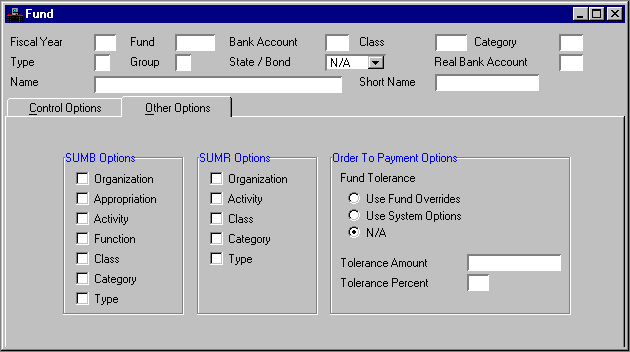|
|
|
|
Fiscal Year
|
Key field. Enter the last two digits of the applicable fiscal year valid on Fiscal Year (FSYR).
|
|
Fund
|
Key field. Enter a fund code. If adding a new code, enter a unique value; if changing or deleting an existing line, enter the code for the applicable fund.
|
|
Bank Account
|
Required. Enter the bank account value to be used by the automated disbursement process (i.e., the primary checking account for the fund). Refer to Bank Account (BANK) for valid values.
|
|
Class
|
Conditional. Required if you report by fund class. Enter the value from Fund Class (FCLS) that best describes the fund defined in this line.
|
|
Category
|
Conditional. Required if you report by fund category. Enter the value from Fund Category (FCAT) that best describes the fund defined in this line.
|
|
Type
|
Required. Enter a valid fund type from Fund Type (FTYP).
|
|
Group
|
Conditional. Required if you report by fund group. Refer to Fund Group (FDGP) for valid values.
|
|
State/Bond
|
Default is
State [S]
. Valid values are:
State [S]
Bond [B]
None [N]
N/A [blank]
|
|
Real Bank Account Code
|
Enter the bank account code to which funds are to be moved.
|
|
Name
|
Optional. Enter the fund name as you wish it to appear (up to 30 characters). If this field is left blank, no name is displayed on reports for this fund.
|
|
Short Name
|
Optional. Enter the name that you want to appear on reports when there is not enough room for the full name (up to 12 characters).
|
|
|
|
Control Options
|
|
Project/Sub-Project/Phase Required
|
Required. Select
[Y]
if Project/Sub-project/Phase are required on all transactions that will have an effect on specific funds. Select
[N]
if Project/Sub-project/Phase are not required on all transactions that will have an effect on specific funds.
|
|
Expense Budget
|
Default is
None [N]
. For more information, refer to the
User's Guide
. Valid values are:
Full [C]
Presence [P]
None [N]
|
|
Revenue Budget
|
Default is
None [N]
. For more information, refer to the
User's Guide
. Valid values are:
Presence [P]
None [N]
|
|
Appropriation
|
Default is
None [N]
. For more information, refer to the
User's Guide
. Valid values are:
Full [C]
Presence [P]
None [N]
|
|
Allotment
|
Default is
None [N]
. For more information, refer to the
User's Guide
. Valid values are:
Full [C]
Presence [P]
None [N]
Cumulative [Q]
|
|
Allotment Frequency
|
Default is
Yearly [Y]
. This field is not used if
Allotment
is
None [N]
.
Enter one of the following, depending on the number of allotment periods desired:
Yearly [Y]
Allotments are expressed on a yearly basis (one period).
Quarterly [Q]
Allotments are expressed on a quarterly basis (four periods).
Monthly [M]
Allotments are expressed on a monthly basis (12 periods).
|
|
Fund Balance
|
Default is
N/A [blank]
. For more information, refer to the
User's Guide
.Valid values are:
Select [C]
Selects the fund balance for the fund.
Reject [N]
Rejects the fund balance option.
N/A [blank]
Defaults to N/A [blank].
|
|
Allotment Include Encumbrances
|
Default is
Yes
[
Y
]. Indicate
Yes
[
Y
] to add encumbrances and expenditures when computing unobligated budget balance for the applicable allotment period. Indicate
No
[
N
] to exclude encumbrances from expenditures when computing unobligated budget balance for the applicable allotment period.
|
|
Memo Depreciation
|
Default is cleared [
N
]. Select [
Y
] if depreciation for this fund is for memo only.
|
|
Sweep
|
Default is cleared [
blank
]. Select [
Y
] if this fund is to participate in the cash sweep process of the Investment Management Subsystem.
|
|
Negativity Equity Indicator
|
Default is cleared [
blank
]. Select [
Y
] if any fund involved in an investment pool fund is allowed to carry a negative balance in the pool fund. You must also select the checkbox [
Y
] if a fund's participating funds are allowed to have a negative balance.
|
|
Cash Edit
|
Default is cleared [
blank
]. Select [
Y
] if fund cash balance is edited on expenditure (check issue) transactions.
|
|
Cash Edit Pool Fund
|
Optional. Enter a cash fund if cash edit for this fund is performed against the pool fund.
|
|
Account Balance
|
Default is cleared [
blank
]. Select [
Y
] if cash edit for this fund is performed against the pool fund.
|
|
|
|
SUMB/ESMB Options
|
|
Organization
|
Default is cleared [
N
]. Select [
Y
] if budget preparation records are summarized by organization on Budget Preparation Summary (Extended) (ESMB).
|
|
Appropriation
|
Default is cleared [
N
]. Select [
Y
] if budget preparation records are summarized by unit of appropriation on Budget Preparation Summary (Extended) (ESMB).
|
|
Activity
|
Default is cleared [
N
]. Select [
Y
] if budget preparation records are summarized by activity on Budget Preparation Summary (Extended) (ESMB).
|
|
Function
|
Default is cleared [
N
]. Select [
Y
] if budget preparation records are summarized by function on Budget Preparation Summary (Extended) (ESMB).
|
|
Class
|
Default is cleared [
N
]. Select [
Y
] if budget preparation records are summarized by object class on Budget Preparation Summary (Extended) (ESMB).
|
|
Category
|
Default is cleared [
N
]. Select [
Y
] if budget preparation records are summarized by object category on Budget Preparation Summary (Extended) (ESMB).
|
|
Type
|
Default is cleared [
N
]. Select [
Y
] if budget preparation records are summarized by object type on Budget Preparation Summary (Extended) (ESMB).
|
SUMR Options
|
|
Organization
|
Default is cleared [
N
]. Select [
Y
] if budget preparation records are summarized by organization on Revenue Preparation Summary (SUMR).
|
|
Activity
|
Default is cleared [
N
]. Select [
Y
] if budget preparation records are summarized by activity on Revenue Preparation Summary (SUMR).
|
|
Class
|
Default is cleared [
N
]. Select [
Y
] if budget preparation records are summarized by object class on Revenue Preparation Summary (SUMR).
|
|
Category
|
Default is cleared [
N
]. Select [
Y
] if budget preparation records are summarized by object category on Revenue Preparation Summary (SUMR).
|
|
Type
|
Default is cleared [
N]
. Select [
Y
] if budget preparation records are summarized by object type on Revenue Preparation Summary (SUMR).
|
Order to Payment Options
|
|
Fund Tolerance
|
Default is
N/A [blank]
. Select
Use Fund Overrides
[Y]
only if you want to set the tolerances for this fund differently from the settings on System Control Options (SOPT, SOP2); otherwise, if the fund tolerance amount and percent are zeroes, the system defaults to the amount specified on System Control Options (SOPT, SOP2). To achieve this you may also select
Use System Options [N]
. This indicator prevents the system from defaulting when both fund tolerances are zeroes.
|
|
Tolerance Amount
|
Default is
0.00
. Enter a valid dollar amount to specify the variance you will tolerate between purchase orders and final payments. The system will use the most restrictive amount.
|
|
Tolerance Percent
|
Default is
00
. Enter a valid percent to specify the variance you will tolerate between purchase orders and final payment. The system will use the most restrictive amount.
|





